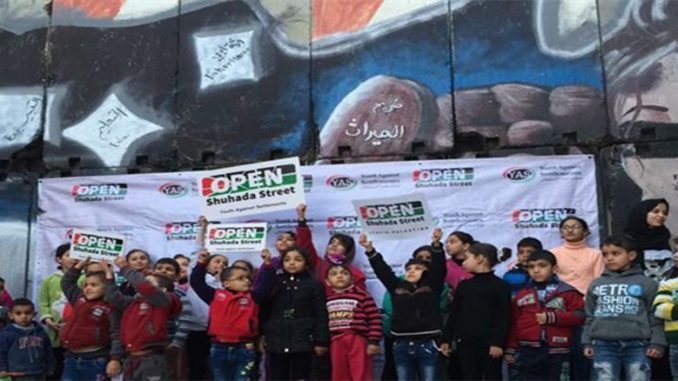On Feb. 24 1994, American-born Israeli settler Baruch Goldstein opened fire on Muslim worshipers at the mosque in the southern occupied West Bank city, killing 29 and injuring more than 120.
Following the massacre, the Israeli army divided Hebron, with the majority of the city placed under the jurisdiction of the Palestinian Authority, while the Old City and surrounding areas were placed under Israeli military control in a sector known as H2.
The vigil was the first action to kick off a week of scheduled events marking the anniversary, and was organized in cooperation with Ibrahimi Kindergarten and independent organization the National Coalition of Martyrs’ Families in Hebron.
Around 100 children from Ibrahimi Kindergarten partook in the vigil.
Youth Against Settlements coordinator and outspoken advocate of nonviolent resistance Issa Amro said that a worldwide campaign was simultaneously taking place, and that 10 activists from Hebron would tour 12 European countries where similar activities were being organized.
Sunday night’s vigil started with a speech by Amro, who briefed the children about the history of Israeli closures in Hebron and about the Ibrahimi mosque massacre. Palestinian children, he said, “should stay firm and never fear the Israeli occupation.”
Director of Ibrahimi Kindergarten Zleikha al-Muhtasib briefed the participants about the daily suffering children experience during their commute to school as a result of Hebron’s heavy presence of Israeli soldiers and settlers.
She urged solidarity activists who joined the vigil to report on the suffering of Palestinians in Hebron to the international community, as locals say Hebron has turned into a ghost town due to the heavy militarization and settler hostility.
Spokesman for the National Coalition of Martyrs’ Families Nasser Ghulma urged the Palestinian Authority to declare the anniversary of the Ibrahimi mosque massacre an international day for solidarity with Hebron.
On the massacre’s anniversary last year, Amnesty International slammed Israel for maintaining “severe and discriminatory restrictions on movement” that were imposed on Palestinian residents of Hebron after the massacre, while allowing Israeli settlers free access.
Increased military presence spread across the Hebron district amid a wave of unrest that began in October 2015, with Israel installing military checkpoints at the entrances to many Hebron-district villages as residents reported harassment, arbitrary detentions, and an increase in traffic and curfews.
Areas of Hebron’s Old City — where the Ibrahimi mosque and al-Shuhada street are located — came under intensive military presence in particular, and were declared a “closed military zone” for months.


